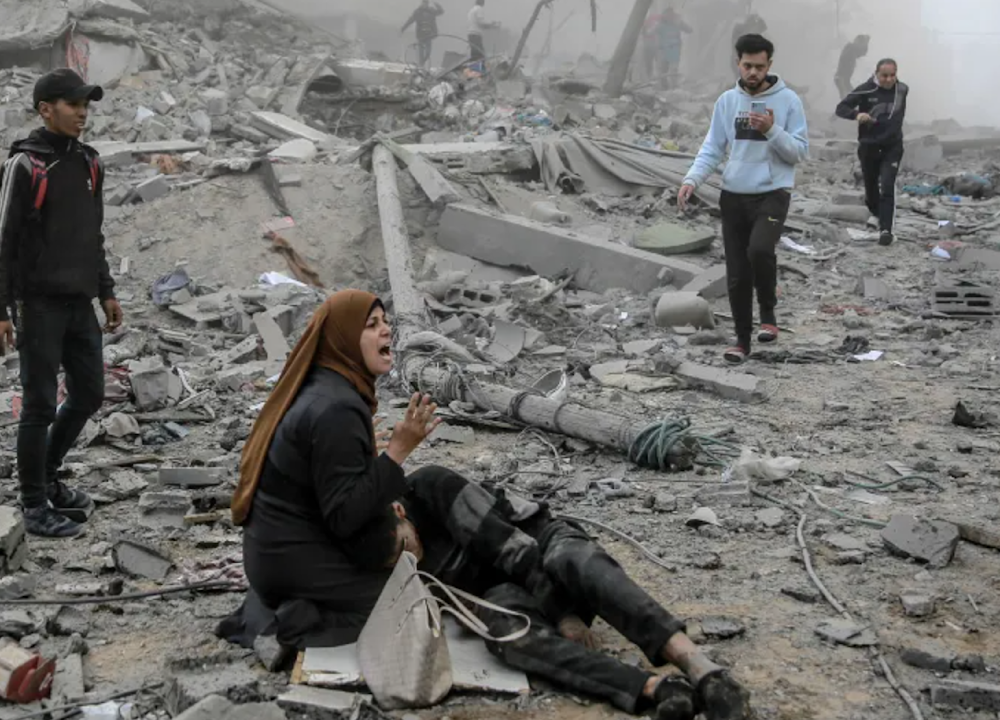UK aid to 'Israel' helps fuel massacres in Gaza: Oxfam
Oxfam Chief Executive Halima Begum calls the British transfer of weapons to "Israel" a "failure in moral leadership and the values of humanity."
-

A Palestinian woman reacts as she cradles a wounded boy hurt by Israeli bombardment in central Gaza on March 18, 2024. (AFP)
Britain's refusal to restrict military aid to the Israeli occupation is contributing to "Israel's" heinous slaughter of Palestinians, Oxfam reported.
The UK-based NGO condemned the UK government for granting "Israel" more than 100 weapons export permits since it started its brutal military onslaught in the beleaguered Gaza Strip in October.
Oxfam Chief Executive Halima Begum expressed Wednesday that "this has occurred in the unequivocal knowledge that tens of thousands of innocent Palestinian children and their parents are being killed by Israel's prosecution of the war in Gaza."
Begum described the UK's actions as a "failure in moral leadership and the values of humanity."
The number of Palestinians killed since the start of the Israeli aggression on Gaza on October 7 has risen to 37,202 and those injured to 84,932, the Ministry of Health in the Gaza Strip confirmed on Wednesday.
On the 250th consecutive day, the Israeli occupation persists in its devastating campaign against the Gaza Strip, conducting bombings and raids across multiple regions, leading to further casualties.
Begum also chastised the British government for supporting the delivery of even more weaponry to "Israel" while discussing peace in Gaza, stating that halting all permits for weapons sales would send a "powerful message" that the UK is serious about a long-term ceasefire.
The total value of UK-approved arms export permits to "Israel" was £42 million in 2022, with the number for 2023 due later this week.
Oxfam has repeatedly warned the UK government that failing to ban military shipments might result in complicity in the genocide, presenting evidence alongside Human Rights Watch in early 2024 of Israeli breaches of international humanitarian law in Gaza.
Last month, pro-Palestine demonstrators blocked numerous weapons factories, protesting the shipment of weapons to the occupation.
On May 1, protesters blocked the UK Trade Department in London and BAE Systems’ arms factories in Scotland, Wales, and Lancashire.
Majority of young Britons believe 'Israel' must not exist: UnHerd poll
The majority of young people in Britain do not believe that "Israel" should exist, a new poll conducted by UnHerd revealed. The preliminary findings, part of an exclusive survey of 1,012 voters about foreign policy conducted by Focaldata, indicate that 54% of 18-24-year-olds agreed with the statement that "the state of Israel should not exist," with only 21% disagreeing.
According to the numbers, this sentiment among the UK youth aligns with other polling data from UnHerd on the same issue.
When asked "who was more to blame for the war in Gaza," 50% of young respondents pointed to "Israel", while 25% blamed Hamas, and 19% responded "all equally."
UnHerd also underscored the high visibility of the Gaza genocide on social media and noted that it appears to have significantly influenced young people's opinions.
The poll gave the example of the AI-generated graphic, "All Eyes on Rafah," which was shared over 44 million times on Instagram, and pro-Palestine content has proliferated on TikTok.
Further, UnHerd's polling indicated, that, significantly, the UK youth showed greater interest in the unfolding of the war on Gaza than in other global conflicts.
For example, the poll noted that among 18-24-year-olds, 38% reported being very interested in the Gaza war, while 28% were somewhat interested. In comparison, only 19% and 44% were very or somewhat interested in the war in Ukraine, respectively.
As the war on Gaza remains ongoing, public opinion in the UK has gradually shifted in favor of Palestine.
Historic polling shows that support for "Israel", which was at its highest at 21% shortly after the 7th of October, had radically dropped to 16%, according to YouGov figures.
These findings reflect a significant generational divide in attitudes regarding the Israeli occupation and Palestine conflict and suggest a growing pro-Palestinian sentiment among Britain's youth.

 4 Min Read
4 Min Read








